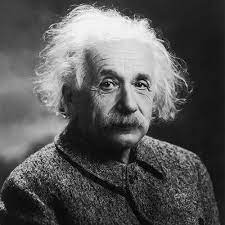Albert Einstein was a renowned physicist and mathematician who is considered one of the greatest scientific minds in history. He was born on March 14, 1879, in Ulm, in the Kingdom of Wurttemberg in the German Empire, which is now part of Germany. Einstein’s early years were marked by a strong interest in math and science, and he showed exceptional talent in these subjects even from a young age.
Einstein received his education in Switzerland, where he attended the Swiss Federal Polytechnic in Zurich. After graduating in 1900, he worked as a patent examiner at the Swiss Patent Office in Bern. During this time, he conducted groundbreaking research and published several influential scientific papers that would revolutionize the field of physics.
One of the most interesting facts about Einstein is his theory of relativity. In 1905, he published the special theory of relativity, which introduced the famous equation E=mc², demonstrating the equivalence of energy (E) and mass (m) and the relationship between them with the speed of light (c). This theory challenged classical Newtonian physics and provided a new understanding of space, time, and gravity.
Albert Einstein’s theory of relativity revolutionized our understanding of space, time, and gravity. The theory had a profound impact on physics and led to numerous technological advancements. For example, the theory of relativity played a crucial role in the development of nuclear energy and the creation of atomic weapons.
Another major contribution to physics by Einstein was the development of the general theory of relativity, which he formulated between 1907 and 1915. This theory extended the special theory of relativity and provided a new understanding of gravity as the curvature of spacetime caused by mass and energy. The general theory of relativity predicted several phenomena, including the bending of light around massive objects and the existence of black holes.
Einstein’s work on the theory of relativity also had practical applications. It contributed to the development of GPS (Global Positioning System) technology, which relies on precise timing and the accurate measurement of distances based on the principles of relativity. Without Einstein’s theories, GPS systems would not function with the level of accuracy we enjoy today.
Einstein also made significant contributions to quantum mechanics, particularly with his work on the photoelectric effect, for which he was awarded the Nobel Prize in Physics in 1921. His research on the photoelectric effect helped establish the fundamental principles of quantum theory and laid the groundwork for the development of quantum mechanics.
In addition to his scientific achievements, Einstein was also known for his outspoken views on social and political issues. He was an advocate for civil rights, pacifism, and the pursuit of global peace. Einstein’s pacifist stance became more pronounced during World War I and continued throughout his life.
He was known for his thought experiments and his ability to approach problems from unconventional angles. His imaginative thinking allowed him to make groundbreaking discoveries and challenge established scientific beliefs.
In 1933, with the rise of the Nazi regime, Einstein, who was Jewish, left Germany and moved to the United States. He accepted a position at the Institute for Advanced Study in Princeton, New Jersey, where he continued his research and teaching. During this time, he actively contributed to scientific discussions and mentored young physicists.
Einstein’s legacy extends beyond his scientific contributions. He was a vocal proponent of education and encouraged intellectual curiosity in others. His quotes and writings on a range of topics, from science and philosophy to politics and ethics, continue to inspire individuals worldwide.
Here are a few lesser-known facts about Albert Einstein:
1. Late Development: Einstein’s early development was a bit delayed compared to most children. He reportedly didn’t start speaking until around the age of three, which initially worried his parents. However, once he began talking, he quickly caught up and showed exceptional intellectual abilities.
2. Music and Violin: Einstein had a great passion for music, particularly playing the violin. He began playing the violin at a young age and continued to enjoy it throughout his life. He often found playing the violin to be a source of relaxation and creative inspiration.
3. Unconventional Clothing: Einstein was known for his unconventional fashion sense. He often wore baggy, mismatched clothes, which led to his iconic disheveled appearance. He once famously remarked that dressing the same way every day saved him valuable time and mental energy.
4. Offered Presidency of Israel: In 1952, after the death of Israel’s first president, Chaim Weizmann, Einstein was offered the presidency of Israel. However, he declined the offer, explaining that he lacked the necessary skills and experience for such a political role.
5. Love for Sailing: Einstein had a deep love for sailing and spent many summers sailing on a small boat named “Tinef” on the waters near his summer residence in Long Island, New York. Sailing provided him with a sense of freedom and tranquility, and he often found it to be a way to escape the pressures of his work.
6. Brain Study: After Einstein’s death, his brain was preserved for scientific study. Researchers were interested in understanding if there were any physical differences in his brain that could account for his extraordinary intelligence. Some studies suggested that his brain had certain unique features, but the results were inconclusive and remain a subject of debate among scientists.
7. Humanitarian Efforts: Einstein was a strong advocate for social justice and humanitarian causes. He actively spoke out against racism, injustice, and the arms race. He was involved in civil rights movements and supported organizations working towards peace and disarmament.
These lesser-known facts provide a glimpse into the multifaceted personality of Albert Einstein. His brilliance extended beyond science, and his interests, quirks, and values make him a fascinating figure in history.
Albert Einstein passed away on April 18, 1955, at the age of 76. His contributions to science, his unique approach to problem-solving, and his advocacy for peace and social justice have solidified his place as one of the most influential figures in human history. His name and iconic image have become synonymous with genius and innovation.
By: SIDHARTHA MISHRA
Write and Win: Participate in Creative writing Contest & International Essay Contest and win fabulous prizes.















